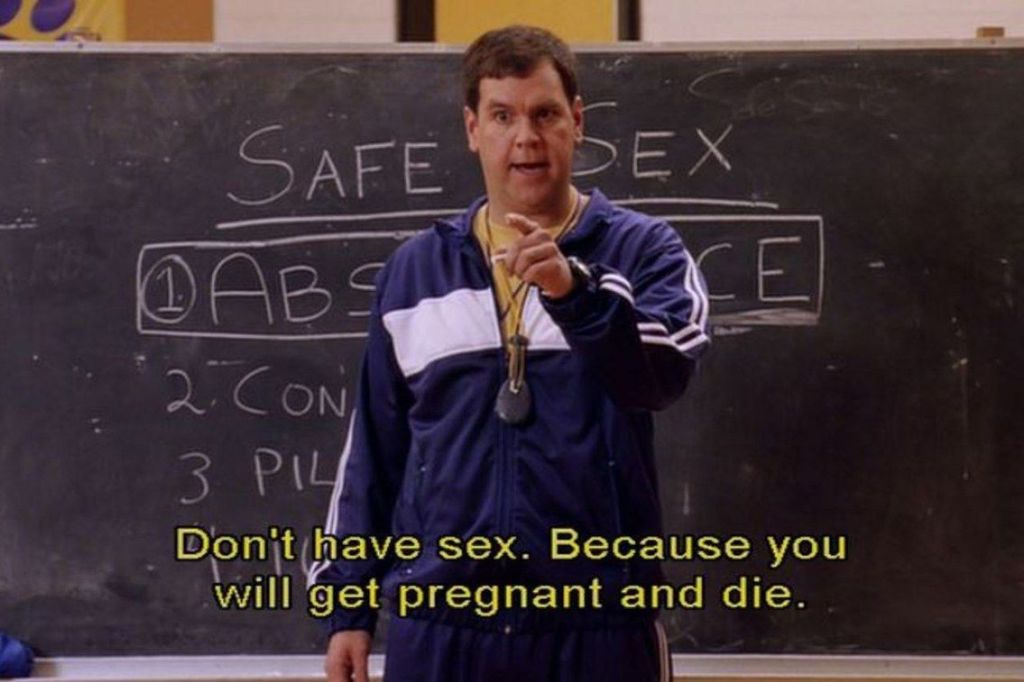“What grade would you give the sex ed you received as a young person?”
That was an icebreaker question I asked our Community Advisory Council at a recent meeting. Nearly every member gave the sex ed they received a C, D, or F grade. Maybe you would, too.
Terrible sex ed seems to be a nearly universal experience, but it doesn’t have to be! Below is a list of some of the things that time and experience have shown simply don’t work anymore in sex ed—and what we’d like to see instead.
1. Scare tactics?
 You might remember the scene in Mean Girls when the gym teacher points at his bored students and says, “Don’t have sex. Because you will get pregnant and die.” Or maybe you remember your own sex ed teacher showing graphic, close-up pictures of genitals exhibiting severe STI symptoms. These strategies exaggerate the negative consequences of sexual behavior, vilify sexually active youth, and use shame to try to scare young people away from sex.
You might remember the scene in Mean Girls when the gym teacher points at his bored students and says, “Don’t have sex. Because you will get pregnant and die.” Or maybe you remember your own sex ed teacher showing graphic, close-up pictures of genitals exhibiting severe STI symptoms. These strategies exaggerate the negative consequences of sexual behavior, vilify sexually active youth, and use shame to try to scare young people away from sex.
Instead, quality sex ed provides medically accurate information without exaggeration or bias. While educators can and should address the risks that can come with sexual activity, this can be done in a way that respects young people as capable decision makers.
2. Gender separated classes?
It’s common in many schools for boys and girls to be separated for sex ed lessons. These gender separated classes reinforce a false binary, and can leave some students wondering where they fit. Separated classes set the stage for sex as a taboo topic that is not to be discussed with the opposite sex. Finally, separated groups are more likely to receive disparate education that can reinforce gender stereotypes. This article from the Sexuality Information and Education Council of the United States (SIECUS) is a great overview of the harms that can come from gender separated sex ed.
Instead, sex ed should be a safe and inclusive place for all students to understand themselves and their peers. With the right preparation and training, teachers can make sex ed classrooms comfortable for all.
3. Abstinence-only curricula?
In the early 2000s, the federal government invested millions in “abstinence-only-until-marriage” programs. These programs withhold or distort information on contraceptives and condom use, rely on shame and guilt, and promote gender stereotypes. Study after study has shown that these programs simply don’t work to delay adolescent sexual activity. One important study examined the impact of abstinence-only programs on over 2,000 adolescents. Four years after participation in the programs, the study found no differences in sexual abstinence or condom use between students in the abstinence-only programs and the students in the control group.
Instead, comprehensive health education programs have been shown to delay the age of first sex, reduce unprotected sex, and reduce unintended pregnancy. Our friends at the Women’s Fund of Omaha have put together an extensive report on comprehensive health education.
4. Programs that ONLY focus on health facts, not on skill building?
It’s important for young people to learn about things like reproductive anatomy, contraceptive methods, and how STIs are transmitted. But sex ed programs that focus only on these health facts do students a disservice. Sex ed is different from other types of education. It addresses topics that are deeply personal, and that are tied to our bodies, our relationships, and our values. When sex ed ignores these areas it’s harder for students to connect it to their lived experiences.
Instead, good sex ed programs help students build life skills. These include healthy communication, recognizing signs of an unhealthy or abusive relationship, setting boundaries and managing conflicts, and learning how to make decisions that align with our personal needs and desires. These are skills that transcend our sex lives, and set students up for meaningful, healthy relationships throughout their lifespan.
Are you an educator who wants to improve your sex ed programming, but you’re not sure where to start? Healthy Teen Network’s Sex Ed 101 for Educators is a set of free, self-directed online modules that can help prepare educators to facilitate great sex ed. You can also follow us at In Control Nebraska, powered by Reproductive Health Collaborative Nebraska, for more information like this.